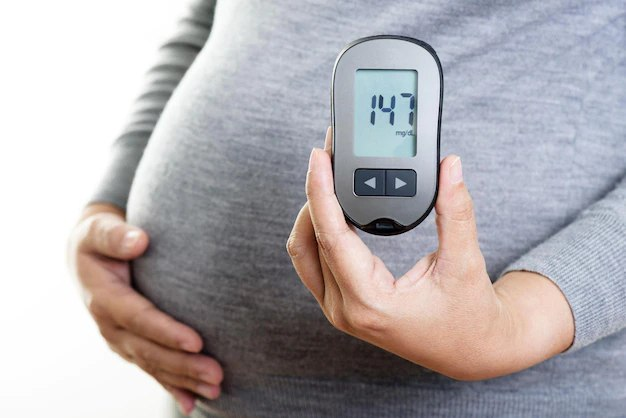What is the glucose tolerance test for pregnancy?



Pregnancy can be a time of joy and excitement for expectant mothers, but it may also come with certain risks. One of the most common and serious risks pregnant women face is gestational diabetes (GDM). Diabetes in pregnancy can present several health complications for both mother and baby. So, pregnant women must be aware of the risk factors for GDM and the screening tests available.
Pregnant mothers are strongly advised to take more food and gain more weight during their pregnancy. Low blood sugar levels can be just as problematic as other pregnancy complications.
This article will discuss diabetes in pregnancy, gestational diabetes, risk factors for GDM, and the oral glucose tolerance test (OGTT) and OGTT screening.
Diabetes is a chronic condition that affects the body's ability to regulate blood sugar levels. Diabetes is the most common pregnancy-related illness. The hormones your body makes when you become pregnant can make it hard for your body to utilize insulin properly. Due to this reason, being pregnant puts you at a higher risk of developing diabetes.
Diabetes in pregnancy can present several health complications for both mother and baby. These complications include Spontaneous baby abortions, foetal malformations, oversized babies, Premature labour and birth, and an increased risk of caesarean delivery.

Diabetes in pregnancy could be of two types. It could either be Pregestational Diabetes or Pregnancy-related (Gestational) Diabetes.
Diabetes diagnosed in women before getting pregnant is termed pre- gestational Diabetes mellitus. It could be type I or Type II DM. Many women diagnosed with gestational diabetes are likely to have type 2 diabetes that has gone undiagnosed in the past.
Gestational diabetes (GDM) is a form of diabetes that affects pregnant women who have never had diabetes before. It is a severe condition that can affect both mother and baby. It is estimated that 2-10% of all pregnant women will develop GDM during their pregnancy.
GDM can be managed, but it is essential to be aware of the risk factors and to be screened for GDM.
Being overweight or obese,
Having a family history of diabetes,
Having had gestational diabetes in a previous pregnancy
Having a baby weighing more than 4 kg in an earlier pregnancy.
Having Polycystic Ovary syndrome (PCOS)
Origin from an area with a high prevalence of diabetes (South Asia, black Caribbean, Middle Eastern)
Pregnant women with the above risk factors for developing GDM are very strong candidates to be screened for Gestational diabetes and frequent monitoring.
The symptoms of gestational diabetes include increased thirst, increased frequency of urination, dry mouth, tiredness, and blurred vision.
Identifying and treating GDM as early as possible is essential to minimize potential risks to the mother and baby. A routine evaluation of a pregnant woman will typically include a glucose screening test. The glucose screening tests aim to determine whether or not there is any alteration in the patient's blood sugar levels.
The Oral Glucose Tolerance Test (OGTT) is an essential glucose challenge test for diagnosing and monitoring diabetes. It measures how well your body can process sugars to help determine the health of both the mother and baby during pregnancy.
The OGTT screening blood test is offered to all pregnant women in the 2nd Trimester of pregnancy, around 24-28 weeks of pregnancy. Identifying and treating GDM as early as possible is essential to minimize any potential risks to the mother and baby.
If your urine glucose level is high during typical prenatal visits or if you are at an increased risk for developing gestational diabetes, your doctor may recommend performing the test sooner.
For at least 8 hours before your initial blood sample is obtained, you should not eat, drink, or refrain from engaging in vigorous exercise. Drinking glasses of water is acceptable, but no other liquid. This helps in determining your fasting blood glucose level.
Make sure to disclose to your doctor if you are currently taking any medications. You might need to discontinue taking the drug if it can alter test results.
It is a two-step process. Your fasting blood glucose level is initially taken, and the result serves as a baseline for subsequent measurements. You are then required to take a glucose drink which is a water solution containing glucose. The amount of glucose differs from country to country—the WHO recommends a 75mg glucose solution.
After drinking the solution, two subsequent blood samples are taken hourly to determine blood glucose levels. Then, three glucose tests will be carried out to measure your blood sugar to diagnose gestational diabetes.
If your fasting blood sugar level is below 5.3 mmol/l and your blood sugar level is one hour after drinking, the glucose solution is 10.0 mmol/L (180 mg/dL) or less. In that case, your OGTT test results are considered normal. If there are no abnormal numbers, this suggests that you do not have gestational diabetes.
Abnormal OGTT results when an oral glucose tolerance test of 75 grams is administered and monitored for two hours and the fasting blood sugar levels are above 7 mmol/l; The one-hour blood glucose levels are greater than ten mmol/l, and the two-hour measurements are above 8.5 mmol/L.
Gestational diabetes is diagnosed when more than one of the measurements shows that your blood sugar is above standard.
People experiencing significant adverse effects from this test are quite rare.
The flavour of the glucose solution is similar to a highly concentrated version of soda. Some women may experience nausea, sweating, or spinning after drinking the glucose solution.
Some women experience discomfort when the needle is placed to draw blood. At the same time, some reported feeling little more than a slight pinprick or sting. There may be some soreness or bruising following the procedure, but it disappears shortly.
Controlling blood sugar levels is associated with improved outcomes for the pregnant woman and the foetus. Gestational or Pre-gestational Diabetes can be treated with dietary changes, insulin therapy, self-glucose monitoring, and keeping regular prenatal check-ups.
Lastly, there is a variety of blood tests available online for pregnant women. These tests can help provide important information about the health of the mother and baby and can be accessed from the comfort of home. Many of these tests are low-cost and can be found on our e-pharmacy here. Taking advantage of these tests can give pregnant women peace of mind and ensure they are taking the necessary steps to ensure a healthy pregnancy.










Plus get the inside scoop on our latest content and updates in our monthly newsletter.